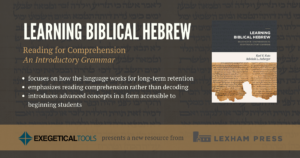Is Learning Biblical Hebrew Impossible?
How’s your Hebrew?
Now, there’s a question that conjures a lot of head-hanging.
Even accomplished readers of Greek can struggle to grasp Biblical Hebrew. And that’s a problem: More than two-thirds of the Scriptures were inspired in a language that many pastors and seminarians (and scholars!) hardly understand.
Why do so many students struggle to retain what they’ve learned? Perhaps they had the wrong priorities the first time around.
The authors of Learning Biblical Hebrew: Reading for Comprehension (Lexham Press) think so, as they shared in a recent episode of Tool Talk. Karl Kutz and Rebekah Josberger of Multnomah University and Biblical Seminary have built a thriving Hebrew program for all kinds of students. Kutz and Josberger write,
“It is not just the brilliant, linguistically-minded students who thrive. Students who would never identify themselves as scholars or linguists surprise themselves by falling in love with the language and more deeply in love with Scripture and its Author” (xxii).
And so can you.
Whether you’ve taken years of classes or you plan to teach yourself, here are two priorities for learning Biblical Hebrew in 2019:
1. Focus on learning about the language like you would a friend.
Languages, like people, have quirks.
But here’s the thing: as you spend time with people and become their friend, you begin to recognize that these irregularities are not random. They can be predicted. As you learn more about their stories, you can even begin to understand some of why they do the things they do.
The authors of Learning Biblical Hebrew want you to know the language “as one knows a person” (xxiii). In other words, you should shift your priorities from memorization alone to understanding:
“Long-term retention is directly linked to how easily students can read and how quickly they can access the text without extensive recourse to aids. They key factors in promoting long-term skill are a strong vocabulary base and broad exposure to the text. Further, students retain more when their learning is based on understanding rather than rote memory” (xxiii).
There is a baseline of rote memorization that is absolutely essential to learning any subject, languages included. However, there is a rate of diminishing return on pure memorization. This is the plateau, and many would-be Hebrew readers reach it only to stagnate or, worse yet, slide back down.
On the pages of Learning Biblical Hebrew, you’ll find in-depth explanation and analysis of the whys of the language.
But wouldn’t it be ironic if you sought to simply memorize the explanations? There’s one obvious way to make it stick—for good.
2. Get into the good stuff from the start.
You’ve got to memorize pronouns (which might be funnier than you think), and you certainly need to know how to differentiate his horse from your horse.
But there’s very little extrinsic motivation to learn if that’s all you’re doing.
You’re learning Hebrew to understand the Bible at a deeper level. That’s going to take time and commitment, but there’s a shallow end to this pool. And the water is fine.
In the forthcoming workbook (April 2019), Kutz and Josberger provide a graded reader to get students into large swaths of Scripture. Read the story of Joseph and the books of Ruth and Jonah, all while gaining a deeper understanding of the nuances of the language. This is the kind of motivation that can propel students to internalize what they’re learning and retain it for the long haul.
But why stop there? Consider reading the Psalms in Hebrew from shortest to longest as part of your daily Scripture reading. Get a hold of a reader’s Hebrew Old Testament, so that rare words are defined and you can stay in the text.
If you already know Greek, compare the Septuagint’s translation of the Hebrew with the handsome new Reader’s Edition. If you don’t know Greek, make plans for 2020!
Learning Biblical Hebrew for a Lifetime
If you thought that learning Biblical Hebrew was impossible, then you need to try shifting your priorities.
By shifting your priorities toward a deeper understanding of the language, you’ll be better equipped to face the quirks that inevitably come up.
By shifting your priorities toward digging into the biblical text, you’ll see the fruits of your labor more quickly and become even more familiar with the nuances of Hebrew.
If you thought that learning Biblical Hebrew was impossible, then you need to try Learning Biblical Hebrew.



